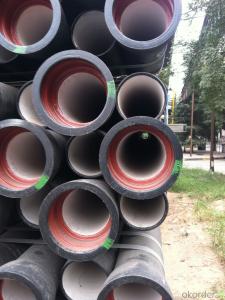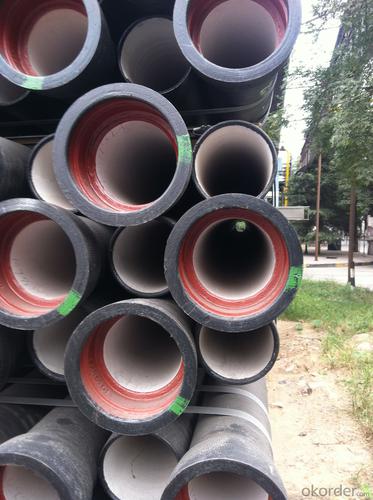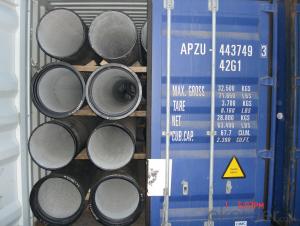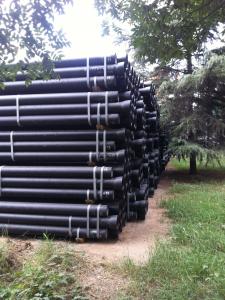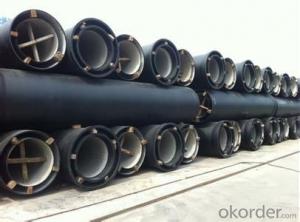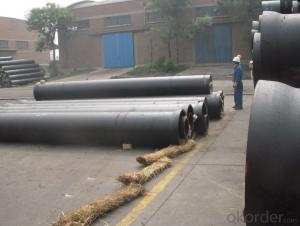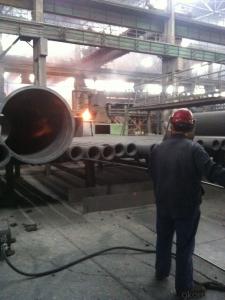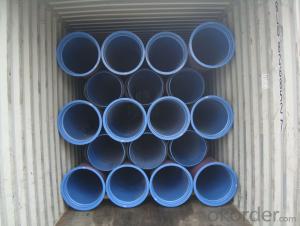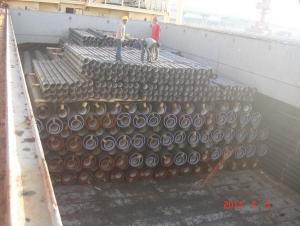DUCTILE IRON PIPE AND PIPE FITTINGS K8 CLASS DN80
- Loading Port:
- Tianjin
- Payment Terms:
- TT OR LC
- Min Order Qty:
- 23 pc
- Supply Capability:
- 3000 pc/month
OKorder Service Pledge
OKorder Financial Service
You Might Also Like
Material : Ductile Cast Iron
Size Range : DN 80mm to DN 2000mm
Unit Effective Length : 6m or 5.7m
Manufacture Standard: ISO 2531:1998/ EN 545:2006/EN 598:2007
Annual capacity : 200,000 tons
Coating Exterior: Zinc 130g/m2 according to ISO 8179-1 and bitumen coating 70 microns.
Cement Interior: Portland Cement/ High Alumina Cement/ Sulphate Resisting Cement Lining according to ISO 4179
Special requirements on external coating and internal lining can be applied
We also provide accessories such as SBR/EPDM rubber gaskets, lubricant paste, pipe caps, PE sleeves, etc.
Additional Parts:
Each pipe is strictly inspected according to related standard to ensure permanently high performance.
Easy Installation at site and service free for life
Long Service Lifespan
Quotation will arrive you within 24hours once we get your inquiry.
We guarantee offering you a competitive price.
A copy of original inspection reports of pipes will be offered after shipment.
Photos of loading process will be sent to the customer after shipment effect.
We will follow-up the delivery progress after shipment effect and update to the customer on weekly basis.
- Q: Are ductile iron pipes suitable for industrial water systems?
- Yes, ductile iron pipes are suitable for industrial water systems. They possess excellent strength, durability, and corrosion resistance, making them ideal for transporting water in industrial settings. Additionally, their ductility allows them to withstand high pressure and accommodate for ground movement, ensuring long-term reliability in industrial water systems.
- Q: Can ductile iron pipes be used in culvert or storm sewer applications?
- Certainly, culvert or storm sewer applications can make effective use of ductile iron pipes. Renowned for their strength, durability, and flexibility, ductile iron pipes are an excellent choice for such purposes. They possess the capability to endure heavy loads, resist corrosion, and handle high flow rates, thus establishing them as a dependable option for culverts and storm sewers. Moreover, their extended lifespan and low maintenance needs further contribute to their appropriateness in these applications. Furthermore, ductile iron pipes can be easily installed and are available in various sizes and configurations to suit the specific requirements of culvert or storm sewer projects. In summary, ductile iron pipes have been extensively employed and proven to be an efficient and long-lasting solution for culvert or storm sewer applications.
- Q: What is the cost of ductile iron pipes compared to other pipe materials?
- The cost of ductile iron pipes can vary depending on various factors such as size, length, and supplier. However, in general, ductile iron pipes tend to be more expensive compared to other pipe materials such as PVC (polyvinyl chloride) or steel. This is mainly due to the manufacturing process and the inherent qualities of ductile iron that make it a durable and reliable choice for various applications. Ductile iron pipes are known for their high tensile strength, resistance to corrosion, and durability, making them suitable for carrying potable water, wastewater, and other fluids under high pressure. The production process of ductile iron involves adding magnesium to cast iron, which results in improved strength and flexibility. This additional process, along with the quality of the material, contributes to the higher cost. On the other hand, pipes made from materials like PVC or steel can be less expensive. PVC pipes are lightweight, easy to install, and relatively inexpensive, making them a popular choice for low-pressure applications such as irrigation or drainage systems. Steel pipes, known for their strength and durability, are often used in high-pressure applications but come at a higher cost than PVC. Ultimately, the cost of ductile iron pipes may be higher initially, but their longer lifespan and reliability can offset the investment over time. Additionally, factors such as the specific project requirements, local regulations, and availability of materials can also influence the overall cost comparison between ductile iron pipes and other pipe materials.
- Q: Can ductile iron pipes be used for stormwater drainage?
- Yes, ductile iron pipes can be used for stormwater drainage. Ductile iron pipes are known for their strength and durability, making them suitable for various applications, including stormwater drainage systems. These pipes have high tensile strength and can withstand heavy loads and pressure, making them ideal for carrying large volumes of stormwater. Additionally, ductile iron pipes have a smooth interior surface that reduces friction and allows for efficient flow of water, minimizing the risk of blockages and clogging. With proper installation and maintenance, ductile iron pipes can provide a reliable and long-lasting solution for stormwater drainage.
- Q: How can the cast iron pipe of the ductile iron pipe be repaired?
- Get a pole. Or go around the corridor
- Q: What are the different lining materials available for ductile iron pipe?
- Ductile iron pipes have multiple options for lining materials, which serve to safeguard the pipes from corrosion and prolong their lifespan. Some commonly used lining materials are as follows: 1. Cement Mortar Lining: This lining comprises a layer of cement mortar applied to the inner surface of the pipe. It serves as a durable and smooth barrier against corrosion, making it a popular choice for water and wastewater applications. 2. Polyethylene Encasement: In this method, the pipe is wrapped with a layer of polyethylene film. This lining delivers excellent protection against corrosion and is frequently employed in aggressive soil conditions. 3. Polyurethane Lining: Polyurethane lining is a spray-applied substance that forms a seamless and flexible barrier within the pipe. It offers exceptional resistance to chemicals and abrasion, making it suitable for applications involving aggressive fluids. 4. Epoxy Lining: Epoxy lining is widely chosen for lining ductile iron pipes due to its outstanding resistance to corrosion and chemicals. It is typically applied as a liquid coating that cures to form a protective and smooth layer. 5. Zinc Coating: Zinc coating, also known as galvanizing, involves applying a layer of zinc to the external surface of the pipe. This lining provides corrosion resistance and is commonly utilized in outdoor and exposed applications. These diverse lining materials offer distinct advantages and are selected based on the specific requirements of the application. Factors such as the nature of the transported fluid, environmental conditions, and expected service life play a crucial role in determining the most suitable lining material for ductile iron pipes.
- Q: Can ductile iron pipes be used for pressure surge applications?
- Yes, ductile iron pipes can be used for pressure surge applications. Ductile iron is known for its high strength and durability, making it suitable for handling pressure surges caused by water hammer or other transient events. It has the ability to absorb and withstand these sudden pressure changes without experiencing significant damage or failure. However, proper design considerations and installation techniques should be followed to ensure the safe and effective use of ductile iron pipes in pressure surge applications.
- Q: Can ductile iron pipes be used in tunneling or microtunneling projects?
- Tunneling or microtunneling projects can utilize ductile iron pipes. These pipes possess strength, durability, and flexibility, making them appropriate for underground applications. They can endure the external pressure from the surrounding soil or rock during tunneling, guaranteeing the project's integrity and safety. Furthermore, ductile iron pipes exhibit exceptional corrosion resistance, a vital characteristic for tunneling projects where the pipes are exposed to moisture and other corrosive substances. Moreover, their internally smooth surface facilitates the fluid or material flow through the pipes, rendering them an optimal selection for tunneling or microtunneling projects.
- Q: Can ductile iron pipes be used for marine applications?
- Yes, ductile iron pipes can be used for marine applications. Ductile iron is known for its high strength and durability, making it suitable for various environments, including marine environments. It has excellent corrosion resistance properties, which enable it to withstand the harsh conditions of saltwater exposure. Additionally, ductile iron pipes have been used in marine applications such as wastewater treatment plants, desalination plants, and offshore platforms. However, it is important to consider proper coating and maintenance to enhance the longevity of ductile iron pipes in marine applications.
- Q: Can ductile iron pipes be used for wastewater treatment plants?
- Yes, ductile iron pipes can be used for wastewater treatment plants. Ductile iron pipes are known for their strength and durability, making them suitable for handling the harsh and corrosive environment of wastewater treatment plants. These pipes can withstand high pressures and are resistant to corrosion, which is essential in handling wastewater and various chemicals involved in the treatment process. Ductile iron pipes also have the advantage of being easy to install and maintain, with a long service life. Therefore, they are commonly used in wastewater treatment plants for transporting and distributing wastewater throughout the facility.
Send your message to us
DUCTILE IRON PIPE AND PIPE FITTINGS K8 CLASS DN80
- Loading Port:
- Tianjin
- Payment Terms:
- TT OR LC
- Min Order Qty:
- 23 pc
- Supply Capability:
- 3000 pc/month
OKorder Service Pledge
OKorder Financial Service
Similar products
Hot products
Hot Searches
Related keywords
